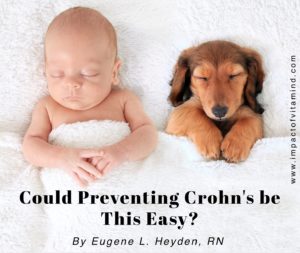Crohn’s and the Hygiene Hypothesis
Last update: 08-31-22
By Eugene L. Heyden, RN
This kid is doing things right—out in the sun, having fun, and making lots of vitamin D. And he’s dirty, too. How nice! You think he is playing. He is, but he is doing something else. He is preventing Crohn’s. Yes, vitamin D helps prevent Crohn’s disease. And, surprise surprise, so does dirt. There are organisms in dirt—especially bacteria—that help teach his immune system to defend against evil. They may even establish colonies that will play a role in bowel health, perhaps lasting a lifetime. Think of dirt as a probiotic. It is teaming with organisms; we might as well give them a good home.
Here we will discuss what is called The Hygiene Hypothesis, and it is a big deal in the research literature. It helps explain why one of the most advanced nations on earth has so many chronic, immune system-related diseases, Crohn’s included. We are not the same people we were a generation or so ago. We are cleaner. We should be dirtier. We hide from the sun. Trouble follows.
I’ll talk more about vitamin D and its role in the prevention of Crohn’s in another post. But now, let’s take a look at the role dirt and dirty things (like worms) play in protecting us from Crohn’s. Crohn’s is dreadful. We should prevent it.
Since this is a rather long story, we’ll begin our journey here. Then, should you wish to read more, I invite you to click on the PDF link at the end of this post. The entire article will then magically appear. Let’s get started. Fasten your seat belt; this will be quite a ride.
(Excerpt from More to Consider in the Battle against Crohn’s)
“Yes, we have a worm for that!”
Improved hygiene is believed to result in a limited exposure to micro-organisms. Such exposure is thought to be necessary in programming the immune system of the gut and mitigating its future inflammatory responses, perhaps even resulting in CD [Crohn’s disease] when the immune system is challenged. The underlying premise is that early childhood infection helps to establish the immunological balance between pro-inflammatory Th1 and tolerance-inducing regulatory T cells, preventing the subsequent untoward responses to allergens, microbial or other antigenic stimuli. Thus various childhood circumstances such as day care attendance, presence of siblings, and domestic hygiene-related factors can influence the probability of contracting a “viral infection” at a vulnerable time in immunological development. ~Koloski et al., 2008
Children and adults from developing countries are often infested with helminthic organisms like ascariasis and hookworms. Helminths promote TH2 responses and blunt TH1 responses. Exposure to Schistosoma mansoni protects rats from development of IBD. With improved sanitation, helminths have disappeared in developed countries. This disappearance of helminths coincided in time with the emergence of IBD. ~Desai and Gupte, 2005
Perhaps the most sticking glimpse of the important alliance between mankind and “infectious agents” is the demonstration that the feeding of pig pinworm (Trichuris suis) ova to patients with Crohn’s disease results in striking improvement in disease activity. ~Epstein, 2005
This chapter is based on what is called the Hygiene Hypothesis, a theory that helps explain some very intriguing observations related to the pathogenesis of both Crohn’s disease and ulcerative colitis. The Hygiene Hypothesis is not a silly notion, trivial, or an insignificant train of thought; it is a big deal in the research literature. I’m not sure you’re ready for this chapter (you’re not), but it is time we had this little talk. This will be a most unusual chapter. Most unusual.
The Hygiene Hypothesis basically states: “If a cookie falls on the floor, of course you pick it up and eat it. Or better yet, you give it to an infant or to a child—and there is no 10-second rule!” Yes, my friend, we can now fight the battle against Crohn’s with dirty cookies. Apparently, with dirty cookies, dirty houses, dirty children of dirty working parents, dirty siblings—dirty everything!—we can fight the good fight and gain an edge in our battle against this disease. And we all know what dirt means; dirt means automatic exposure to bacteria and other little creatures that roam the earth. Our immune system learns from this stuff! (If we survive.) On the other hand, according to the hypothesis, living a clean life is like totally problematic. With limited exposure to pathogenic threats or limited exposure to a wide variety of bacteria, both good and bad, particularly during childhood, our immune system—particularly in the gut—simply lacks the training it will need to defend effectively and do so in an orderly fashion. Even the resolution of inflammation may be impaired for this very same reason (just a guess). Next time you see a clean little infant or child, try not to stare, and try not to shed a tear.
The Hygiene Hypothesis helps explain why early childhood infections are protective against Crohn’s. It explains why being from a large family living in crowded quarters is protective against Crohn’s. It explains why having a pet dog, even a fake pet dog (stuffed animal), is protective against Crohn’s. It also explains why routinely visiting an outhouse is protective against Crohn’s. (You didn’t do this, did you?) It even explains why antibiotic use can be a set-up for contracting Crohn’s at a later period in life—antibiotics effectively reduce the bacterial diversity in the gut, a diversity one relies upon to crowd out bacteria that are evil. It explains so much! It even explains why, once we began to succeed in our quest to rid the world of parasitic worm infestations in various populations, Crohn’s disease began to emerge from out of nowhere and begin the ambitious task of conquering the world. So it should come as no surprise, in the crazy world that you live in, that worms are making a comeback. And we’re in luck! There are somewhere between 18,000 and 24,000 different species of parasitic worms from which to choose (Nava-Castro et al., 2011).
Behold the helminth!
The “IBD hygiene hypothesis” states that raising children in extremely hygienic environments negatively affects immune development, which predisposes them to immunological diseases like IBD later in life. Modern day absence of exposure to helminths appears to be an important environmental factor contributing to the development of these diseases. ~Weinstock and Elliott, 2009
Helminths are thought to play an important immunoregulatory role in the intestinal flora and as such have been linked to the development of IBD. Firstly helminthic infection is associated with a strong Th2 response, which opposes the Th1 response associated with autoimmune disease and CD [Crohn’s disease]. Secondly, chronic infection with these organisms may generate a network of regulatory T (Treg) cells that secrete transforming growth factor (TGF)-B and interleukin (IL)-10. ~Koloski et al., 2008
Loss of natural helminth exposure removes a previously universal Th2 and regulatory immune biasing imparted by these organisms. Helminths protect animals from developing immune-mediated diseases (colitis, reactive airway disease, encephalitis and diabetes). Clinical trials show that exposure to helminths can reduce disease activity in patients with ulcerative colitis and Crohn’s disease. ~Elliott et al., 2007
Let’s face it, you were way better off when you had a good case of worms—pin worms, hook worms, even tape worms! But no, you had to go and rid yourself of these pests and become one of them there modern, sophisticated-type human beings—big mistake! This category of creatures, known collectively as helminths, played an important role in shaping and regulating our immune responses over the millennia. In fact, not only were they protective against Crohn’s (and ulcerative colitis), they were protective against several immune system diseases including asthma, type 1 diabetes, and multiple sclerosis (Elliott et al., 2007). It is clear that having worms (or being wormless) determines who you are, at least from immunological standpoint. And there is hope.
In this modern day and age, you can, if so motivated, infect yourself with worms (you are scaring me!). People actually do this, and their Crohn’s disease goes into remission. So how does all this work? Better yet, what can we learn from this . . . so we don’t have to do this?
A good worm infection, one that you can be proud of, can be easily acquired in the following manner: Go to a third world country, walk barefoot in contaminated soil, let the worm burrow under the skin between your toes, and enjoy what’s up next (besides the intense itching). What’s up next? The worm 1) wiggles and chews its way through the tissues and enters the bloodstream; 2) migrates to the trachea (your trachea), all the while laying eggs at every stop along the way, lots of eggs; 3) climbs out of the bloodstream and into the lumen of the trachea; and 4) crawls around a little, then tunnels through the tracheal wall, slipping smack dab right into the esophagus (your esophagus) where it is subsequently swallowed, as anticipated (by the worm), in order find a home in the gut, your gut. There is no place like home, and the helminth has finally arrived. It sucks up to its new host, you, and drinks your blood. (see Prichard, 2009, for review) Any part of this sound like fun to you? Of interest, and associated with a good worm infection, one that you can be proud of, a million or more worm eggs will be produced per day! (Bundy et al., 2000) Your immune system will be very busy dealing with all the new little hatchlings. You should consider selling at least some of them—have you seen the price of worms these days?
The question is, of course, “How does this worm business protect me from IBD?” The answer is simple, yet so extremely complex. Simply put, “The worm changes you!” You are modified, and manipulated, by the likes of a little ol’ worm! The helminth is a “master” at modifying your immune responses so that it gets to live, and it gets to make babies—and it does so in a manner that surprisingly benefits you, the gracious host (Moreau and Chauvin, 2010). How nice! It really is a sweet little story of the length that a loving worm will go to in order to provide the ideal home for itself and for its dear family. But it is still all about you. The worm will modify your immune system in a manner that protects you from a variety of immune system disorders. That being said, it is still all about them. They will render you ineffectual at expelling them—actually hundreds if not thousands of “thems”—that now call you “home sweet home.” Providing a suitable home to a family of worms simply underscores what a nice person you have become. But none of this has really happened. Your wormlessness has led you down the path of disease and destruction.
Let’s take a look at what the helminth actually does to help an individual in a manner that is pleasing. Preventing Crohn’s is pleasing. Placing the Crohn’s patient in remission is pleasing, too. I will lay out the most interesting and the most relevant data that I have been able to find on the subject, as follows:
To continue reading click here
Note: References above are found in the PDF file.
Related articles (Click on image to open)
Copyright © 2016–2022 Eugene L. Heyden, RN
All Rights Reserved

DISCLAIMER: The book excerpts and articles featured on this website are offered solely for informational purposes. The information contained therein should be evaluated for accuracy and validity in the context of opposing data, new information, and the views and recommendations of a qualified health care professional, and not to be substituted for professional judgment and guidance or to provide a reason to neglect or delay appropriate medical care for self or for others. It is the reader and reader only who bears the responsibility for any actions that could be construed as being a response to the information presented. The statements and opinions expressed by the author or authors of the information provided on this website have not been reviewed or approved by the FDA or by any other authoritative body, nor is the author endorsing any product or specific therapy mentioned. The book excerpts, articles, statements, and opinions are offered to the reader to broaden his or her understanding of the issues discussed and to help identify options that may be suitable for the individual to pursue, on behalf of self or others, under approval and direction of a qualified physician or medical team member. All questions of a medical nature which arise from the book excerpts and articles available on this website should be directed at qualified health care professional.













